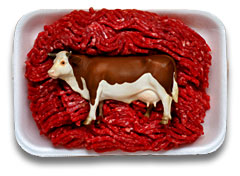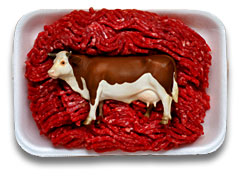Dear Umbra,
I try to eat as many vegetarian meals as possible, but I haven’t “gone all the way” yet, mostly because my in-laws (whom my husband and I live with at the moment) raise beef, chickens, and hunt deer; and my husband and I end up with a lot of free, locally produced meat. How does this fit in with eco-friendliness? Would it still behoove (no pun intended) me to continue to push for vegetarianism? I am by no means a meat-lover and it’s fairly easy for me to pass it up, except when it comes to eating and cooking with my husband’s family. In other words, when they roast one of their own chickens for dinner, does it really make an environmental impact if I said “no thanks,” or am I still reducing my eco-footprint even though I’m the only one at the table not eating it?
Chickened Out
Fayette, Mo.
Dearest Chickened Out,
Two questions here: Is homegrown meat just as bad as all other meat, and if meat’s going to be eaten anyway, can’t we just join in? Maybe the first question will help us answer the second. I freely admit, I want the answer to the first question to be no. (I’m happy to take up hunted meat in another column, but I don’t have enough room to do so here.)

From Mom’s pasture to your plate.
I think we can look at the research on agricultural climate impacts and make some decent inferences. Agriculture contributes significantly to global warming.
Consumers can take simple action to reduce harm through eating meat and meat products less frequently, or cutting meat from their diets entirely. But what of eating ultra-local animals, grown on the farms of family and friends? I think the answer can be found in examining the details of livestock’s impacts, via both the U.N. Food and Agricultural Organization report “Livestock’s Long Shadow” and a recent U.K. study from the Food Climate Research Network.
The FAO estimates livestock-related emissions at 18 percent of the world total. It identifies land degradation, water use and pollution, and loss of biodiversity through deforestation and other pollutions as other major problems affiliated with livestock. The climate impacts of livestock production include creation of potent methane via poop and enteric fermentation in ruminants (cows & co.), refrigeration in the supply chain, food transport, fertilizers, feedstock production, and deforestation. The U.K. study found that agriculture did contribute to CO2 emissions, but the larger footprint came from methane and nitrous oxide emissions.
Looking at this list, I believe that homegrown meat is potentially better than industrially produced meat on many levels. If a farmer is growing in a sustainable manner, using land appropriate to grazing, feeding appropriate and well-grown foods, and managing manure well, it’s all better than poorly managed ag, and they already have the benefits of no refrigerated supply chain and no transport. Additionally, sustainable small-scale growers have opted out of the industrial livestock system as eaters. They aren’t necessarily eating less meat, but they are not supporting irresponsible meat production.
Of course, this is basically a well-informed opinion on my part, not anything supported by data. Fortunately or unfortunately, the dire problems lie in the global supply chain, industrial ag, and resource-poor farmers, and these are the folks whose impacts have been studied. Your family is kind of under the radar.
As for your own diet, carry on eating less meat, and by all means refuse it at restaurants or other people’s homes. If your family is willing to take you into account as they plan their year’s harvest, then refusing it at home will also reduce the amount of meat produced, and that’s no bad thing. If you think they are responsible farmers or you simply wish to maintain domestic harmony, eating some of their meat is also no bad thing. It may even be tasty.
Homesteadingly,
Umbra


